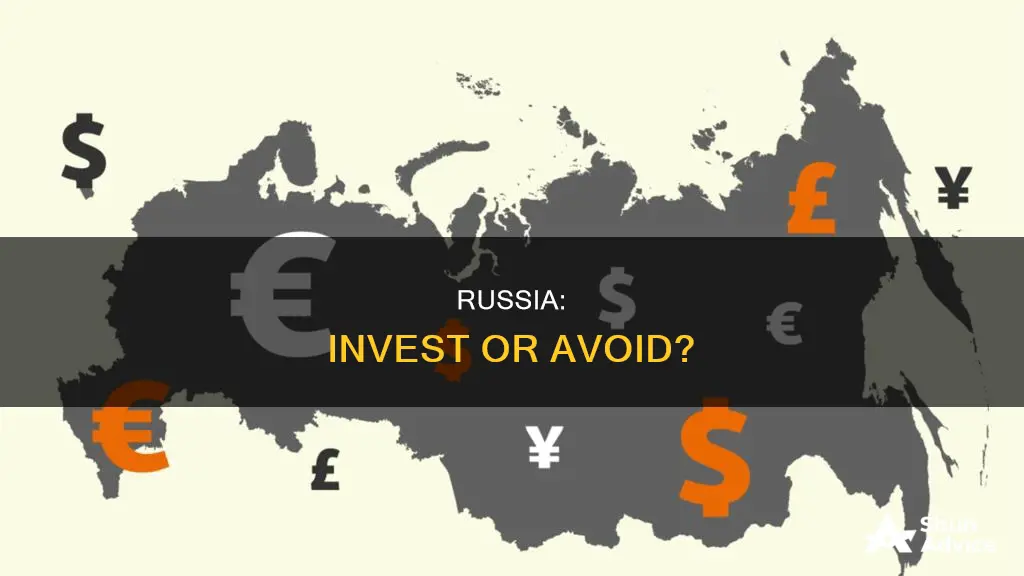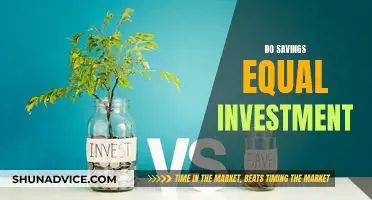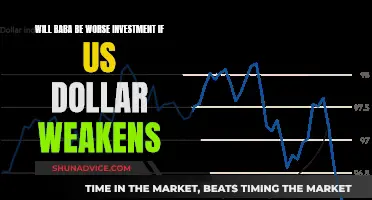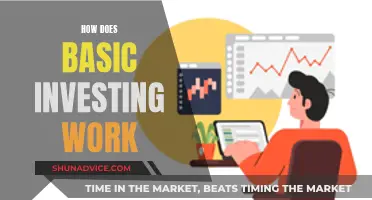
Russia is a tricky country for foreign investors to navigate. Since the collapse of the USSR, the country has been full of opportunities for entrepreneurs, with the government introducing new initiatives to encourage foreign investors. However, the country's reputation for corruption and its unstable political situation, including its invasion of Ukraine, have led to international sanctions and economic downturns. Russia's economy is heavily dependent on its natural resources, particularly oil and gas, leaving it vulnerable to commodity price swings and the impact of economic sanctions. While Russia has a skilled and highly educated workforce, as well as a booming digital economy, investors need to carefully consider the risks and potential rewards of investing in the country.
What You'll Learn

Natural resources
Russia is a country that is rich in natural resources, with natural resources accounting for 95.7% of the country's national wealth. The country holds the world's largest natural gas reserves, the second-largest coal reserves, and the eighth-largest oil reserves. It is also a top producer and exporter of natural gas and oil, with oil and gas being a major part of the national economy. In addition to its fossil fuel resources, Russia also has an abundance of mineral deposits, gold, and diamonds.
Russia's primary market for its oil and petroleum exports is Europe, from which it derives the majority of its oil and gas revenues. The country is also a significant exporter of wheat, fertilizers, and other metals.
Russia's economy is heavily dependent on its natural resource sector, particularly oil and gas. This dependence leaves the country vulnerable to volatile global oil prices and other factors, such as economic sanctions. The country's economy was significantly impacted by sanctions imposed in response to its annexation of Crimea in 2014 and its invasion of Ukraine in 2022.
To mitigate the risks associated with its dependence on natural resources, Russia has been attempting to diversify its economy. The government has implemented initiatives to encourage foreign investment in various sectors, including manufacturing, technology, innovation, tourism, and port and logistics. These initiatives include the establishment of Special Economic Zones (SEZs) and Advanced Development Territories (ADTs), which offer reduced taxes, customs-free zones, and other incentives to attract foreign investment.
Russia's vast natural resources and the government's efforts to improve the business environment make it an attractive destination for foreign investors. However, it is important to consider the risks associated with investing in the country, including political instability, corruption, and the potential impact of economic sanctions.
Investing in Startups: Where to Begin?
You may want to see also

Economic sanctions
Since Russia's invasion of Ukraine, the US, UK, EU, and other countries have imposed thousands of sanctions on Russia. These sanctions have targeted Russia's money, oligarchs, and oil industry. The main goal has been to restrict Russia's ability to finance the war and to target the political, military, and economic elite responsible for the invasion.
The sanctions have had a significant impact on the Russian economy. In 2022, Russia's gross domestic product (GDP) dropped by 2.1%. Russia's economy is forecast to continue shrinking in 2023, with a predicted GDP decline of 2.5% in a worst-case scenario. Russia's revenues from fossil fuels have also diminished due to sanctions targeting oil imports. According to the International Energy Agency, Russia's oil revenues dropped by over 25% in January 2023 and by more than 40% in February compared to the previous year.
The sanctions have also had a devastating impact on the Russian people, who have experienced years of austerity. The Russian government's "Fortress Russia" strategy, aimed at bulking up the economy to protect against sanctions, has involved cutting spending on infrastructure, social services, and education. As a result, ordinary Russians have suffered, and many do not have savings to fall back on.
While Russia has managed to evade some sanctions, the US Treasury claims that sanctions have cut 5% from Russia's economic growth over the past two years. Additionally, the war in Ukraine and sanctions have led more than a million people, many of them young and highly educated, to leave the country.
Funding LLC Investors
You may want to see also

Foreign investment climate
Russia has a lot to offer foreign investors, from its natural resources to its highly educated workforce. However, the country also presents several challenges and risks for those looking to invest.
Since the collapse of the USSR, Russia has been a country full of opportunities for entrepreneurs. The Russian government has implemented numerous initiatives to encourage foreign investors, and the country has jumped from 120th to 31st place in the World Bank's annual ranking of countries with the easiest business setup. This is largely due to the introduction of Special Economic Zones (SEZs) and Advanced Development Territories (ADTs), which offer reduced taxes and customs-free zones to investors.
Russia's tech industry is also booming, with the Kremlin aiming to rebrand the country as a digital economy. Russia is the fourth-largest producer of STEM graduates in the world as of 2017, and over the next five years (2019-2024), $26.2 billion will be invested in the Digital Economy Program. Additionally, Russia is developing its own 'Silicon Valley', the 'Skolkovo Innovation Center', to catch up with other world leaders in technology.
The country's foreign investment climate has improved in recent years, especially with Russia's progress in adhering to the World Trade Organization (WTO) and its attempts to join the Organization for Economic Co-operation and Development (OECD). Foreign investments are encouraged through tax reductions and economic sector reforms. Russia also has a skilled and highly trained workforce, making the country more appealing to foreign investors. The government encourages investment in the oil and gas sectors, food and distribution segments, and the energy area.
However, there are also significant barriers to investing in Russia. Corruption and a lack of transparency are major risks, with the country ranking 137th out of 180 nations on the 2022 Corruption Perceptions Index. The heavy-handed government and a culture of crony capitalism can make it difficult to navigate the bureaucracy and protect your investments.
Russia's invasion of Ukraine has also led to economic sanctions from many countries, further destabilizing the region and impacting the country's economy. As a result, many key players in the global community have shut Russia out, limiting its access to global funds. These sanctions have caused a recession that is expected to continue through 2023.
Overall, while Russia offers high returns and attractive incentives for foreign investors, it also presents significant political and economic risks that potential investors should carefully consider.
Shiba Investors: A Community's Power
You may want to see also

Corruption
The roots of corruption in Russia can be traced back to the Soviet era, where a totalitarian system and constant shortages of goods and services created a universal culture of corruption and bribery. This was further exacerbated by the illegal transfer of billions of dollars from the Soviet state treasury into private accounts across Europe and the US by elites from every corner of the Soviet system.
During the transitional period after the collapse of the USSR, the formation of private property and a complex system of mutual relationships between governors, law enforcement, and the courts contributed to the rise of corruption. Poor regulation of property rights, low salaries in the public sector, and a lack of social guarantees at retirement are also factors that stimulate corruption.
The cost of corruption in Russia is significant, with up to $2 billion per month flowing out of the country. Additionally, international loans often escape abroad in the form of illegal appropriations, embezzlement, and kickbacks to international officials.
Anti-corruption efforts have been made by the Russian government, with President Boris Yeltsin issuing a decree to fight crime and passing the first package of anti-corruption laws in 2008. However, Russia's ranking in the Corruption Perceptions Index has continued to deteriorate, and in 2023, it scored 26 out of 100, the lowest in its history.
The US has also attempted to combat bribery of Russian officials by its citizens through the Foreign Corrupt Practices Act (FCPA). This prohibits the bribery of foreign officials and requires stringent accounting standards to prevent the establishment of "slush funds". However, the enforcement of this law has been challenging due to the lack of cooperation from foreign governments and the competitive disadvantage it places on US businesses.
In conclusion, corruption in Russia is a complex and deep-rooted issue that has evolved into a well-organized network. It poses a significant barrier to foreign investment and has led to substantial economic losses for the country.
Who Really Knows How to Invest?
You may want to see also

Special Economic Zones (SEZs)
SEZs offer their residents a special legal status, resulting in a number of tax and customs benefits. For example, investors in SEZs can benefit from a customs-free zone, accelerated depreciation, reduced social contributions, and a lower tax burden. The privileges of special economic zones last for 49 years.
SEZs have proven successful in attracting foreign investment to Russia. As of March 2010, Russia's federal SEZs hosted 207 investors from 18 countries. As of 2022, Russia's 45 SEZs have attracted 993 investors, including more than 140 foreign companies from 42 countries.
The success of SEZs in Russia can be attributed to the various incentives offered to businesses. For example, businesses in SEZs can benefit from reduced startup costs, with approximately 30% compared to other areas in the country. Additionally, residents of SEZs can benefit from reduced income tax rates, ranging between 0% and 13.5%, compared to the normal rate of 20%. Those investing in Russia and buying property in any of the 28 special zones will also benefit from 10 to 15 years of tax exemption.
Overall, Russia's Special Economic Zones offer a range of benefits and incentives to foreign investors, making them an attractive destination for businesses looking to invest in the country.
Insurance: A Safe Investment Bet?
You may want to see also
Frequently asked questions
There are several risks associated with investing in Russia, including a history of government corruption, a lack of transparency, and political risks. The country's economy is also vulnerable to commodity price swings due to its dependence on oil. The war in Ukraine has resulted in economic sanctions from many countries, further impacting Russia's economy.
Russia has a highly educated and cheap workforce, inexpensive land, and abundant natural resources, including oil, gas, and minerals. The country has improved its foreign investment climate by providing benefits to foreign companies, such as tax reductions and exemptions in Special Economic Zones. Russia also has a skilled and highly trained workforce, making it more appealing to foreign investors.
Foreigners can invest in Russia by setting up a business or investing in Russian stocks through mutual funds, exchange-traded funds (ETFs), and American depositary receipts (ADRs). Russia offers four types of companies available for registration: limited liability companies, closed and open joint-stock companies, branch or representative offices, and sole traders.
Russia encourages foreign investment in sectors such as oil and gas, food and distribution, energy, and high-tech industries. The maritime sector is also attractive due to Russia's access to various seas and oceans.







